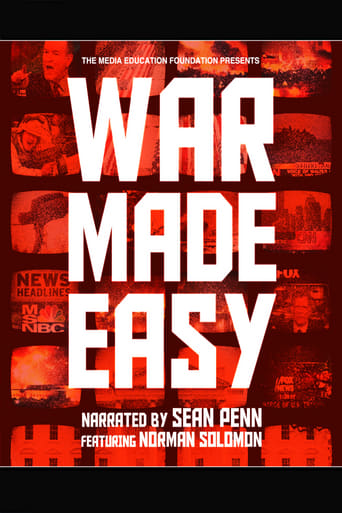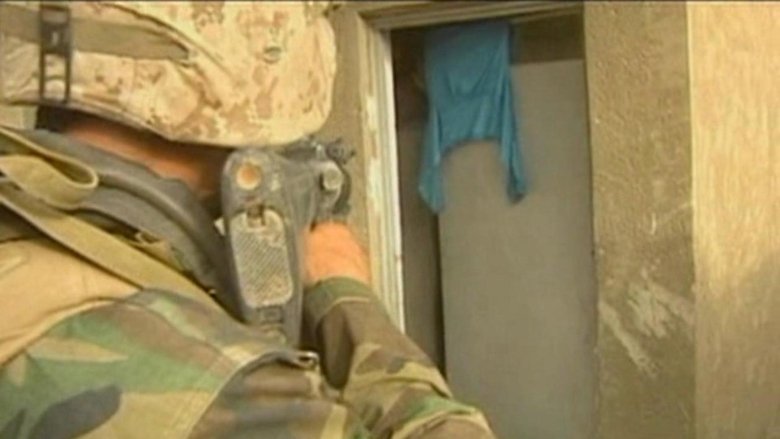

War Made Easy: How Presidents & Pundits Keep Spinning Us to Death (2007)
War Made Easy reaches into the Orwellian memory hole to expose a 50-year pattern of government deception and media spin that has dragged the United States into one war after another from Vietnam to Iraq. revealing in stunning detail how the American news media have uncritically disseminated the pro-war messages of successive presidential administrations.
Watch Trailer
Cast
Reviews
This is How Movies Should Be Made
Great Film overall
Too much about the plot just didn't add up, the writing was bad, some of the scenes were cringey and awkward,
It is interesting even when nothing much happens, which is for most of its 3-hour running time. Read full review
Basically, Norman Solomon's notion, as presented here covers modern wars from Vietnam to the recent adventures in the Middle East. Here's how the process works.Stage One: The government, led by the president, begins beating the war drums against a perceived enemy. The enemy is manufacturing and storing weapons, is a threat to democracy, is a sponsor of an alien ideology, aims at the destruction of America and possibly world domination. The names used (or, rather, called) are always the same -- "evil," "terrorist or communist," "barbaric", "brutal," "ruthless," and so on. The media reports what the government says. Challengers are marginalized and, since the government is the focus of attention in the press, get much less coverage.Stage Two: The war is launched. And now we can't back out because we must "support the troops" or else we are "unpatriotic." The government controls press access to combat so what we see and read becomes a combination of a Fourth of July fireworks display and a Homecoming football game with everyone rooting for our side. Our high technology weapons are lovingly described. The enemy are faceless.Solomon would certainly agree that nothing is as simple as the picture of "going to war" that I've just presented. We get to see a lot of Norman Solomon. He's a soft-spoken, thoughtful, smart guy and wouldn't be easily bamboozled by simplicity. That's why he wrote the book.There are a couple of things I find myself doubting. He downplays the impact of the press on the public's perception of the Vietnam war. And, in fact, the evidence is that the newspapers were laggard in their understanding. But they did come around. I guess it would be safe to say that they usually DO come around eventually and see the process from a more informed perspective.I don't think anyone can underplay the influence of Walter Cronkite's national broadcast in which he admitted that Vietnam had become a stalemate and it was time to leave. It certainly had an effect on Lyndon Johnson. Solomon is right in arguing that it came a little late in the game, but then it's the job of journalists to report what they know, not their opinion of what they know. At least it used to be that way, before some of the cable news channels became instrumentalized.A few new thoughts occurred to me while watching this. During the Iraq and Afghanistan experiences, the government allowed the media wide access to military operations by "embedding" reporters with selected units. But -- it didn't HELP the public. In a perfectly natural process, the reporters became loyal friends of the soldiers of their units and submitted stories favorable to them. (Imagine: A hypothetical Marine throws away his weapon and runs to the rear. Is the embedded reporter likely to publicize the incident?) There is no surer way to bond people than to subject them to the same stress at the same time. And the enemy remains faceless, distant targets to be shot at or bombed.Some of the comments we hear on the morality of war are also thought provoking. Is it somehow more "moral" for a man to release a load of bombs on a city from ten thousand feet in the air, than it is for a man to strap on a vest full of explosives and commit suicide in the midst of those that HE defines as the barbaric enemy? When our guys commit altruistic suicide they become heroes. Why is it a surprise that when they do it, they become heroes too? Finally, I'll cut these comments short because I don't want to run out of space, and because I've gotten so high on this soap box that I'm beginning to feel the effects of cerebral anoxia. This has nothing to do with the dynamics described by Solomon but I wonder if there isn't something within at least some of us that actually WANTS to go to war and kill others. It's not as stupid as it sounds. Testosterone prompts us to engage in aggression and sexual activity and blood levels vary between individuals and groups. (The level is higher in winning soccer teams.) And differences have been found in the brains of those who are more or less likely to go to war, especially in the region of the amygdala, an almond-shaped organ in the mid-brain that controls the fight-or-flight response. It's bigger in those who are more likely to be militant. You can probably Google it easily enough.Finally, I DO wish we'd all stop using the term "cut and run." War at the top isn't a matter of gonads; it's a matter of brains. I'd suggest that anybody who has survived an elementary school-yard fight should outgrow it -- although I think "cut" can be a perfectly apt term to describe a military withdrawal from an unwinnable situation. It's certainly used routinely on Wall Street -- "cut your losses." The alternative can lead to things like Kamikaze attacks and Hitler's order to "retreat not one millimeter."
Powerful, if slightly familiar examination of how the US government lies to get us into war, and how the media goes along. Interesting to see the how Bush, Johnson, Reagan, and even Clinton used such similar language and techniques to manipulate public opinion, and how the media still doesn't generally ask the hard questions. However, it does get a bit repetitive, and it's not like we didn't know much this on the big picture level already. In some ways the Daily Show does it better, if with less historical perspective. None the less, these kind of examinations of our recent history are always worthwhile and thought-provoking.
Norman Solomon is demonstrating that since World War II the US have systematically used war to defend their own interest and nothing else. So democracy and freedom is a lure for the public to fall into the trap of supporting the wars the President and a small group of people decide. He then demonstrates that all these wars are based on a fundamental and founding lie. Vietnam was based on the lie about the attack of some US battleship by the North Vietnamese in the Gulf of Tonkin just as much as the war on Iraq is based on the lie about the Weapons of Mass Destruction. Then he demonstrates how the press is literally forced into supporting the war though apparently very few are willing not to support it and the vast majority of media people are willing to support these adventures or ventures. But he also demonstrates that only two senators voted against the Gulf of Tonkin resolution in 1964 and only one congresswoman from California voted against the war on Iraq. He demonstrated how civilian casualties are increasingly the only casualties that count as for numbers. From 10% during the first world war they have risen to at least 90% in the war on Iraq. The present count of civilian casualties in Iraq are beyond one million. Then I will quote Senator Morse who voted in 1964 against the Gulf of Tonkin Resolution: "Since when do we have to back our President or should we when the President is proposing an unconstitutional action?" That is clear enough. Democracy does not mean to support the President but to take part in the devising of the US foreign policy itself on the basis of all facts provided to people for them to make up their minds. I will then conclude with Norman Solomon: "When it comes to life and death the truth comes back too late." And in the case of Iraq the truth about the weapons of mass destruction is definitely too late since these WMDs justified a war that had thus no justification since they were a willful lie. And this war led to the most obnoxious and inhumane or even inhuman acts on the side of American GIs, like torturing and killing the victims of their own rapes.Dr Jacques COULARDEAU, University Paris Dauphine, University Paris 1 Pantheon Sorbonne & University Versailles Saint Quentin en Yvelines
This is based on Normon Solomon's book of the same title, and he comments at length throughout, with archive footage of politicians, news readers, and reporters. The clips support his thesis that wars are shrewdly packaged and sold to the public with little accountability, with dissenting voices quickly stigmatized as "anti-American" and silenced.This is the way it is presented in the film, and watching it you can't blame the filmmakers for it being "one-sided." That's precisely the point. After getting nothing BUT the other side on basically EVERY news network (not just the usual suspects), these filmmakers take Solomon's argument and run with it. It is tough to argue with his position that we the people are often lied to when it comes to selling a war, MOST if not all the time. (Solomon notes, "If you say something enough times, it starts to sound true.")If you don't agree, at least watch this documentary before you make up your mind. It's that compelling.